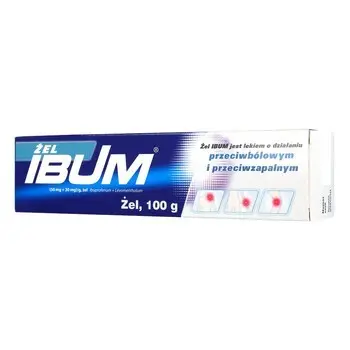Contents
Ibum gel is used in the treatment of muscle pain, back pain, neuralgia, pain in the course of diseases of the muscular and skeletal systems (mild forms of arthritis, sprains, sports injuries). The levomenthol contained in the drug has a cooling effect at the site of application, slightly anesthetic. The preparation is in the form of a gel and is available without a prescription.
mother (Hasco-Lek)
| form, dose, packaging | availability category | the active substance |
| gel (50 g) | OTC (over-the-counter) | ibuprofen, levomenthol (ibuprofen, levomenthol) |
SUBSTANCE 1 g contains: 0,05 g of ibuprofen, 0,03 g of levomenthol.
Ibum gel ACTION
Ibum gel is a non-steroidal anti-inflammatory drug containing levomenthol (it cools and anesthetizes).
Ibum gel – indications and dosage
Ibum gel is recommended for symptomatic treatment of:
- muscle pain
- back pain
- nervousness,
- pain in the course of diseases of the muscular and skeletal systems,
- pain in sprains and sports injuries.
Dosage
Ibum is a gel and is intended for topical and external use. The preparation should be massaged into the affected area until completely absorbed. Do not use the drug for more than two weeks.
- Adults and children after 12 years of age apply 5-12 cm of the gel to the affected area. Do not use more often than 3 times a day, keeping at least 4 hours between doses.
Ibum gel and contraindications
Contraindications to the use of Ibum gel are:
- allergy to any ingredient of the preparation or other non-steroidal anti-inflammatory drugs (also in the history of),
- asthma,
- allergic rhinitis,
- hives or other allergic reactions.
- should not be applied to damaged skin areas.
- should not be used in children under 12 years of age.
Ibum gel – warnings
- Patients with renal insufficiency, heart failure, peptic ulcer disease or impaired liver function should be used with caution.
- People suffering from bronchial asthma with allergic symptoms after taking acetylsalicylic acid, as well as using other drugs (especially drugs that lower blood pressure, diuretics, cardiac and psychotropic drugs) should consult a doctor before starting the use of the drug.
- Also, patients with gastrointestinal complaints, kidney problems and those who have not taken acetylsalicylic acid or other non-steroidal anti-inflammatory drugs before, should contact their doctor before starting treatment.
- Contact of Ibum gel with the eyes and mucous membranes should be avoided.
- Caution should be exercised when taking acetylsalicylic acid or other NSAIDs concomitantly.
- In the event of skin changes at the site of application, the treatment should be discontinued.
- The gel must not be used more often than every 4 hours.
- Hands should be washed thoroughly after each use of the preparation.
- In the case of long-term massaging of the gel into the skin, it is recommended to use gloves.
- If the symptoms do not improve or worsen within 2 weeks of using the preparation, contact your doctor.
- It is not recommended for pregnant women and breastfeeding women (ibuprofen passes into breast milk).
- There is no information on the influence of the preparation on the ability to drive motor vehicles.
Ibum gel with other drugs
There are no known interactions of ibuprofen applied topically with other preparations, however, the effects of oral administration should not be ruled out..
Ibum gel should not be used simultaneously with:
- acetylsalicylic acid or other non-steroidal anti-inflammatory drugs as there is a risk of gastrointestinal side effects),
- antihypertensive drugs and diuretics, as non-steroidal anti-inflammatory drugs may reduce the effectiveness of these drugs
- anticoagulants, as non-steroidal anti-inflammatory drugs may increase the effect of drugs that reduce blood clotting (e.g. warfarin) or thrombolytic factors e.g. streptokinase),
- lithium and methotrexate, as NSAIDs may increase the plasma levels of both lithium and methotrexate,
- zidovudine (bleeding time may increase in patients treated concomitantly with ibuprofen and zidovudine).
- ibuprofen may reduce the effect of inhibition of platelet aggregation caused by the use of acetylsalicylic acid, limiting the protective effect of this drug on the heart in patients at increased risk. Concomitant administration of corticosteroids and non-steroidal anti-inflammatory drugs may increase the risk of gastrointestinal ulcer disease.
Ibum gel and side effects
When using Ibum gel:
- the following may occur: redness and tingling of the skin, rash, itching, urticaria, angioedema, epidermal necrolysis and erythema multiforme, gastrointestinal discomfort, abdominal pain, non-specific allergic and anaphylactic reactions; Respiratory reactions manifested by asthma, worsening of asthma, bronchospasm or shortness of breath.
- also possible (during long-term use): thrombocytopenia, agranulocytosis, headache and dizziness, nausea, relapse of gastric ulcer or gastric bleeding, kidney damage.










